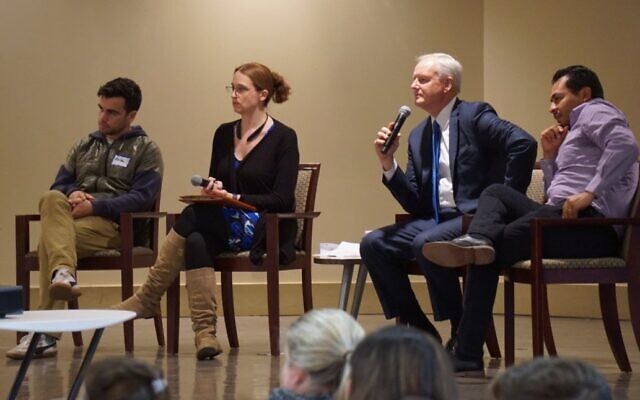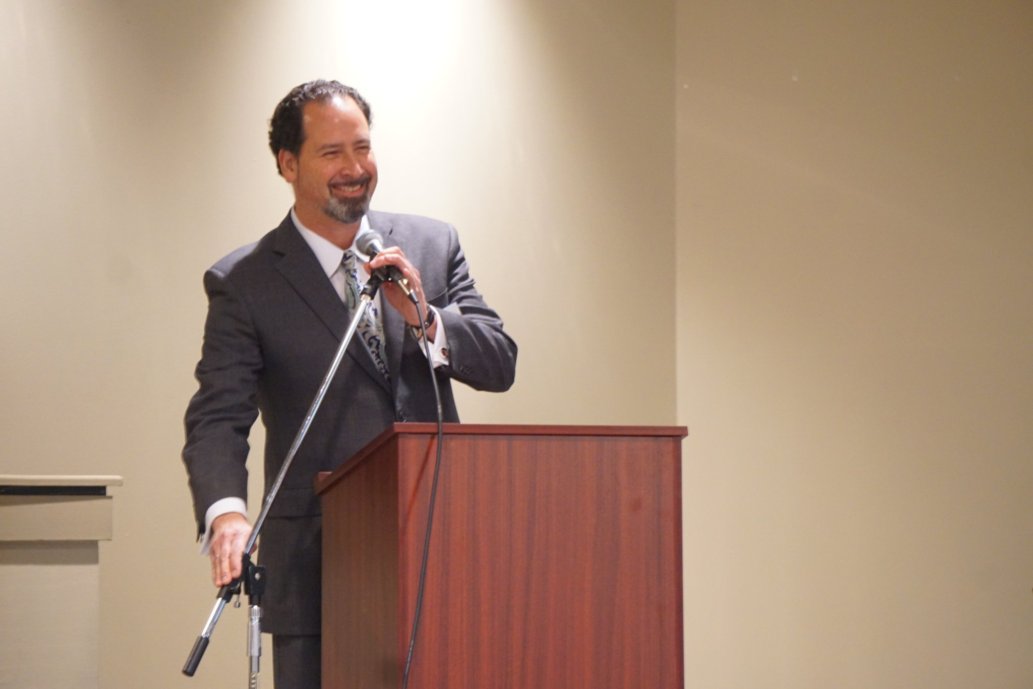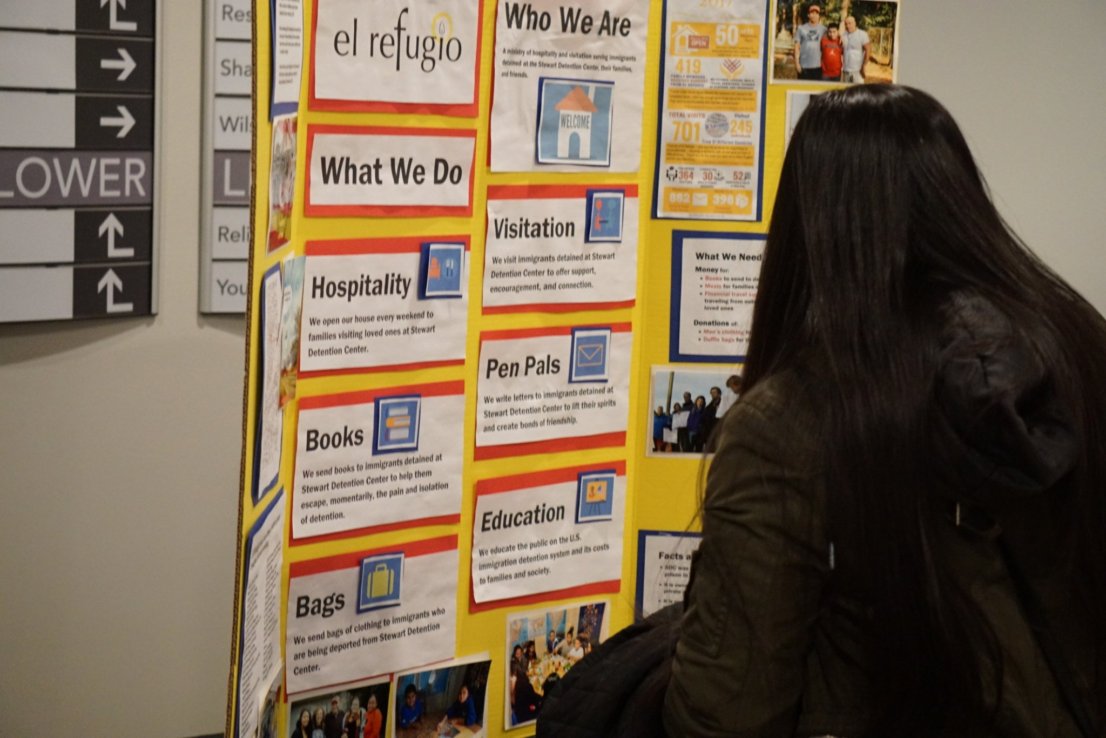Jewish Atlanta Tackles Immigration
With Jewish values in mind, congregants from Temple Emanu-El are part of a community-wide effort to affect change in the immigration system.

With Jewish values in mind, congregants from Temple Emanu-El are part of a community-wide effort to affect change in the immigration system.
They held an event Jan. 26, “Bearing Witness – a Humanitarian Crisis,” that discussed immigration with other Jewish and Atlanta organizations at the synagogue.
Temple Emanu-El and partner groups are focused on nonpartisan social action to change the immigration system while others in Jewish Atlanta grapple with the complexity of the issue.
“This is certainly an emotional issue as we all recognize our own immigrant origins in America and sympathize with the plight of people who just want a chance at a better life,” said Jon Barry, veteran of commercial real estate in Atlanta and current AIPAC liaison for Temple Sinai.
“We need to balance well-intentioned efforts with practicality,” Barry said. “Our first responsibility should be to protect the rights and welfare of American citizens, including those that immigrated legally and are now productive members of our society.”
When Rabbi Spike Anderson of Temple Emanu-El spoke emotionally on the High Holy Days about his trip with his wife to the Southern border, members of the congregation said many were in tears.

In a conversation with the AJT, Anderson described his experience with the massive bureaucracy of the immigration system on the border and the poor treatment of immigrants he witnessed. He also spoke about other efforts, such as an Arizona Jewish group “Arizona Jews for Justice” run by Orthodox Rabbi Shmuly Yanklowitz helping asylum seekers just released from detention with nothing, not even shoelaces in their shoes.
“Once you add the Jewish story to the mix, we have our own immigration story. Our narrative is those who didn’t take us in are on the wrong side of history. … It’s hard to look somebody in the eye and dismiss them.”
Lauren Menis, a Temple Emanu-El congregant, is part of the synagogue’s steering committee addressing immigration and social justice issues. “For me, working together as a whole community rather than one temple really allows you to expand the knowledge,” she said.
Menis and other congregants galvanized community partners, joining with Saint Luke’s Presbyterian Church a few miles down the road, to hold the forum and resource fair Jan. 26. The event was co-sponsored by multiple synagogues and Jewish organizations, such as the Anti-Defamation League and the American Jewish Committee, and a number of immigration rights groups in the area.
Speakers included Traci Feit Love, the founder of Lawyers for Good Government; and Charles Kuck, a prominent immigration lawyer in Atlanta. Also speaking was Ariel Prado of the Innovation Law Lab, and Amilcar Valencia, executive director of El Refugio.
Love spoke about Lawyers for Good Government’s Project Corazon, responding to the U.S. government’s Migrant Protection Protocols, known as the “Remain in Mexico” program, which sends asylum seekers back to Mexico to wait months for their hearing.
“This is the bottom line,” she said. “MPP is a cruel and dangerous program.” Love explained that the conditions are so bad that children have been crossing by themselves. “Their parents say goodbye, walk them to the bridge, and the kids walk across themselves. And the kids walk away. You have to imagine as a parent how dangerous the conditions are and how terrified you are for your children in order to have them do that,” she said. “But from their perspective, it was either that their kids live, or that they stay together. And not both.”
Kuck described the details of the immigration system with regard to asylum seekers, explaining that asking for asylum is following U.S. law. He said that in Georgia, the vast majority of asylum cases – over 90 percent – are denied.
“There’s just lots of negative stuff out there that people tend to believe because they’re told it enough without really trying to get the facts about what really is,” Kuck said
In October 2019, 28 detainees filed a formal complaint with the Department of Homeland Security regarding the conditions at Stewart, claiming the facility was abusive, according to WABE.
In a statement to the AJT, U.S. Immigrations and Customs Enforcement said: “ICE provides safe, humane and appropriate conditions of confinement for individuals in its custody. ICE has a series of detention standards that ensure that individuals with medical conditions or other specific needs receive exceptional care while in our custody, which exceed the standards of most local jails and prisons. Individuals in our custody are also provided access to legal representation, translation services, recreation, and a multitude of other offerings.”
Chuck Berk, chairman of the Republican Jewish Coalition, said: “The U.S. has a very proud heritage and leadership on immigration with more support for refugees than any other country. We should have compassion for people escaping persecution, but we have to be smart about it. We can’t just let anyone in.
“Last year the numbers got larger than our ability to absorb them; the borders were overwhelmed. As a result, the immigration system was badly broken. Since then, the U.S. has ended the policy of catch and release, thereby reducing the number of illegal people allowed into the country. And the U.S. has entered into cooperation agreements with Mexico, Guatemala, Honduras and El Salvador, which has reduced illegal crossings by 75 percent. This had never been done before, and these new policies have vastly improved conditions at the border.”

The two synagogues and St. Luke’s groups that visited Stewart Detention Center in Lumpkin, Ga. and El Refugio drove three hours each way to meet for an hour with detained immigrants behind a window. Temple Emanu-El congregant Susan Goldman met with a man from Liberia whose four children live in Virginia, she said. He had been in Stewart since July. “His face showed anger, his face showed sadness and frustration. Just sadness,” she said. “We were the only people who came to see him. There’s no one to talk to, no one to support him.”
Goldman had spoken with other congregants who had visited Stewart and heard news reports about detained children and wanted to see the situation for herself. Asked whether the conditions were what she expected, she said, “I think they were worse. I didn’t realize it was a prison. … I didn’t realize they would have razor blade-sharp fences around. It was a very humbling experience. [The Liberian man] said that they’re treated as if they weren’t human. They’re nobody. They’re only a number.”
Each person who visited Stewart described that there was very little transparency. “You go through these locked doors. They don’t want anybody here to see anything,” Emanu-El congregant Karen Baron said. “[The detainees] can only get one visitor a week. They’re far away from family, they don’t even know where they are, to be quite honest.”
Menis said of her visit to Stewart, “It seems like you’re walking into a high-security prison. These are just people who want a better life. Many of them have walked many miles from violence, with their kids in their hands … It’s horrific actually. They’re piled into rooms. I feel like it’s my responsibility to bear witness.”
Marita Anderson, wife of Rabbi Anderson, led one of the trips to Stewart. “We’re morally and ethically obligated to keep paying attention. Our Jewish ethics tell us to not turn a blind eye and that we are responsible for this,” she said. She and her husband said they understand the complexity of border security and empathize with Border Patrol agents who deal with human and drug trafficking, but said society can do much better than this.
Baron built a close connection with a 26-year-old asylum seeker from Cuba. “We spoke every bit of that hour. It just went on and on,” she said. “My husband has very broken Spanish; they laughed at each other.” The Barons were the man’s only visitors since he arrived at Stewart in February. “He’s the most appreciative – boy. I have children that are a little older than him. To me, he’s a boy,” Baron said.
She and her husband put money in his commissary every month and send books Stewart accepts from Amazon. A former art teacher in Cuba, the man bought some art supplies and an English book with the money they sent. He has formed an English learning group in Stewart. “I’d do anything for him,” she said. “He’s so appreciative, so needy, and so lost. He doesn’t understand. It’s heartbreaking.”
Marita Anderson emphasized the importance of human contact with immigrants and asylum seekers, describing visits as a “lifeline.” She met with a man who was sent to Ecuador. He had walked to Nigeria from his home country that is suffering a civil war. Then he walked from Ecuador all the way to the U.S. border with Mexico. “These are people who are survivors of violence and survivors of a major trek. And then when they present themselves to the border asking for asylum, we put them in prison,” Anderson said.
After the visit, the group was emotionally exhausted. “These people are trapped, and they’re frustrated and helpless and no one’s doing anything about it. It’s horrific. It’s horrific,” Goldman said. “I’m just distraught about it. It’s heartbreaking. It’s selfish of me to say I don’t want to go back.”
Rabbi Anderson said of his experience that there was “a lot of tears, a lot of anger. I think there was a good amount of shame or shock that we are part of the system that’s doing this.” He knows coming up with solutions is difficult but worries about the lack of oversight and the treatment of immigrants in these detention centers. “It seems the antithesis of the American ideal that we hold ourselves to and I think the Jewish ideal as well.”



comments